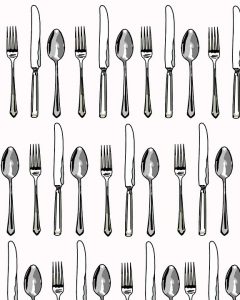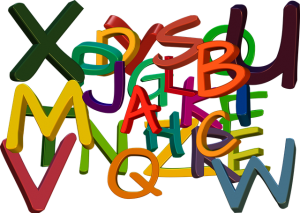
Courtesy Pixabay.com
A Lesson in Tine Language for Restaurant Professionals
The lights are low and the company is scintillating. You’ve got the perfect second glass of wine glow, and you’re delighting in the fact that you didn’t have to cook the meal in front of you or drive up to an oversized squawk box to order it. You throw back your head to laugh at something your friend has just said about your other friend, when all of a sudden you see it, the busboy’s hairy hand coming to whisk away your plate while your companion is still eating.
Major buzz kill.
Why do they always do that?
Or you’re catting up with your other friend about the first friend, when a waiter swings by to utter the over-used under-thought phrase: “You still working on that?”
Working? Yes. This is my job. It was this or medical school.
Now don’t get me wrong, it’s not that I enjoy looking at the carnage of my meal for hours on end, which is the usual Santa Barbara restaurant service alternative to trying to rush you out of there as quickly as possible, but isn’t it about time these servers learned to speak “Tine Language?”
Once upon a time, etiquette goddess Emily Post had a wonderful idea. Why don’t we invent signals for patrons to alert the wait staff that they are still eating, or conversely, that they’ve finished their meals? That way we can avoid all of the pesky hovering over tables, annoying queries about whether we’re still working on our food, and accidental interruptions of embarrassing conversations about PMS, pap smears and other patrons.
Tine Language for, “I’m still eating, and if you come near my plate I’ll eat your finger,” is placing your knife and fork on opposite sides of the plate, tines down, with the fork and the knife kissing daintily in the center.
To say, “I’m finished, please clear my plate,” in Tine Language, simply place the fork and knife on the plate diagonally, with the tines of the fork pointed to the upper left side of the plate. That’s 11 o’clock, for those of you who like to think visually, or 10 o’clock for those of you who don’t observe daylight savings time.
Very civilized, no?
Tine Language is such a simple system, really. No verb conjugation to worry about, no deciding if plates are masculine or feminine. To help move adoption of this new language along a little faster in our local restaurants, which are renowned for their food but never their service, I decided to add a few “Tines” of my own.
Holding a fork in each hand while flapping my arms at the hostess means, “Hello, paying customer here. I’d like to be seated, whether or not my entire party has arrived.”
If, upon arriving at said table, I place the fork on my head (tines up), this means, “The restaurant’s not even remotely full, so would you kindly not seat me on top of the other patrons?” Chances are good that if I don’t know them, I know — or am somehow related to — the person they’re gossiping about, so let the waiter walk the extra five steps that separate our tables.
And when you see me poking a fork in my left eye, this means my blind date is not going well. I’ll slip you a twenty if you escort me from my table into the kitchen to assist with a runaway lobster. When I poke the fork in my right eye, it just means I’m telling a really bad joke.
If I happen to have kids with me, that’s not the only reason I’ve grabbed the knife and am now making a throat slitting motion. It’s also “Tine Language” for “let the waiter walk an extra 17 steps and put me as far away from other customers as possible.”
And if I take that same knife and slit my wrist with it, even if I don’t draw blood, that means, “check please.” If you bring me a Band-Aid, I might even leave you a tip.
Got any other “Tine Language” tips for Santa Barbara’s renowned service economy? Email us at email
Originally appeared in in the the Santa Barbara Daily Sound on April 7, 2006.

